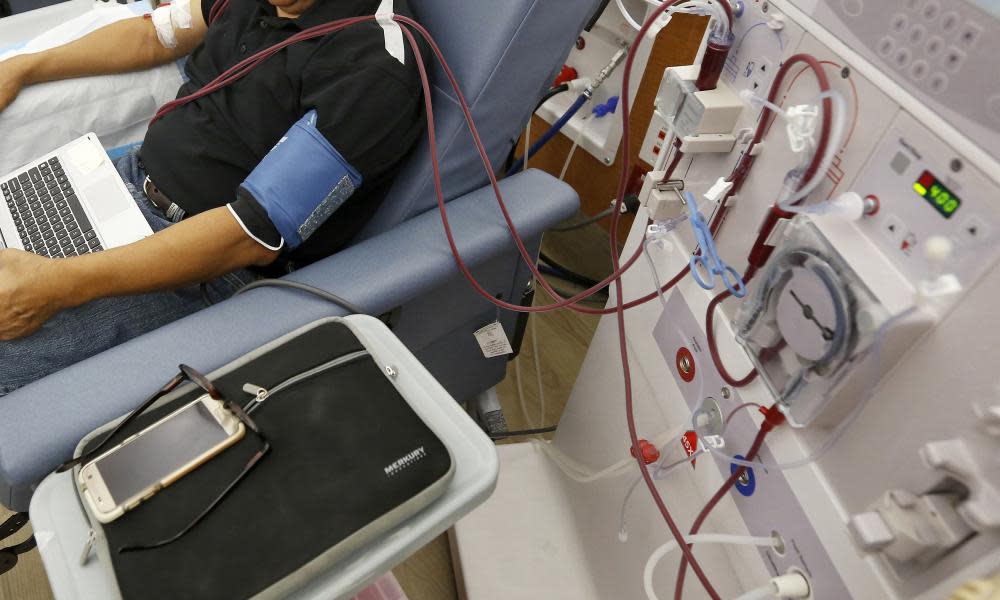California dialysis clinic workers push to unionize over short-staffing and low pay

For 29 years, Guadalupe Tellez, a registered nurse, has worked in the kidney dialysis industry and currently works for the Fresenius Kidney Care in the city of Ventura one of several dialysis clinics where workers are currently pushing to unionize in California.
“We want to improve our wages, benefits and patient care overall. There’s a lot of issues in dialysis that need improvement and it’s been years and years and years, and it seems like the companies are not doing anything to improve any of it,” said Tellez.
Related: ‘It can be scary’: how corporate America is hitting back against unions
Nearly 500,000 Americans receive some sort of kidney dialysis treatment every year at over 7,500 dialysis clinics in the US, costing about $90,000 a patient every year. The US market for kidney dialysis is worth more than $24bn annually.
Workers throughout the dialysis industry – vital to many Americans with health issues – are often short-staffed, paid low wages with benefits that are expensive to access and are significantly lower than wages paid to comparable workers in other sectors of the healthcare industry.
Two corporations, DaVita and Fresenius, own about 70% of the dialysis clinics in the US and the growth of large corporate chains in the market resulted in increased patient loads of 11.7% per employee, according to a 2019 analysis of 1,200 dialysis clinic acquisitions over a 12-year period.
The dialysis industry has aggressively fought legislative efforts to rein in the immense profits of the industry in California, spending millions of dollars to oppose bills and ballot initiatives, including over $110m in opposition to a 2018 ballot initiative to limit profits to 15% above the amount spent on patient care.
The Service International Employees Union-United Healthcare Workers (SEIU-UHW) has been campaigning for years to improve working conditions, and unionize workers at dialysis clinics.
That fight has intensified recently. In November, about 300 workers at 13 dialysis clinics in California filed to hold union elections to become the first dialysis clinics in the state to unionize. In December, the first three clinics successfully won their union elections, becoming the first dialysis clinics in California to unionize and another four clinics unionized later that month. Four more clinics in California won union elections in January.
Since Tellez’s clinic filed for a union election in November, she said management has brought in union avoidance consultants, often holding captive audience meetings and distributing anti-union flyers.
“The management has been very aggressive and intimidating in harassing union supporters,” added Tellez. “I want them to respect the workers’ decision about unionizing. We’re not only doing this to improve workers’ quality of life, but we also want to improve patient care.”
Mike Badilla, a dialysis patient care technician in Gilroy, California, at Satellite Healthcare, where workers recently won their union election, explained when he first started working in the dialysis industry, he worked in a role devoted to setting up dialysis machines that has since been dissolved and merged with the duties of other workers.
“Patient to staff ratios increased from when I first started working in the industry from three to one to four to one and now sometimes five to one,” said Badilla. “I’ve been in the industry for 20 years and I keep losing and losing and losing. When I first started I used to get a stipend biweekly to get insured through Kaiser Healthcare, but it slowly dwindled to zero dollars to now paying about $1,000 a month to get insured.”
Badilla said working conditions and staffing issues during the Covid-19 pandemic worsened and those experiences were a catalyst for workers wanting to unionize dialysis clinics despite intense opposition from management.
“A lot of people kind of felt like, wow, this abuse is real and this is how they treat us, this is what they think of us and this is how they’re going to protect us and our families when we put in our, our heart and soul in the community to do our best, but it felt like we weren’t getting anything in return,” Badilla added.
Eugene De La Pena, a dialysis patient care technician for 23 years who currently works at Satellite Healthcare in San Francisco, where workers recently won their union election, said poor working conditions put patients at risk.
“It’s really tough to work on those days as dialysis technicians while short-staffed,” De La Pena said. “That puts patients at risk, because if you have more than four patients to support, it’s really a lot and it makes it even harder for us to really comply with the policies and procedures.”
He said he is often asked to perform maintenance or troubleshoot issues with dialysis machines, but those extra duties aren’t compensated in his paycheck. The low pay, De La Pena said, forces many workers in the industry to jump around between different companies in order to get higher wages because annual wage raises are typically low.
“We’ve voiced our concerns and none of the management came to have a dialogue with us and now they come to us to tell us to stop the union. I stood up to say enough is enough, we want the company to be held accountable for their actions moving forward,” added De La Pena.

